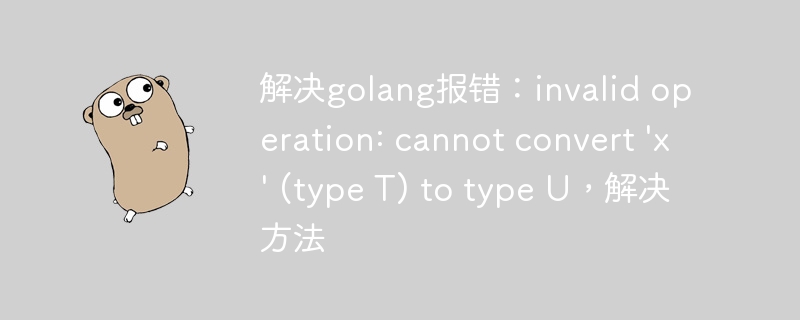Home >Backend Development >Golang >Solve golang error: invalid operation: cannot convert 'x' (type T) to type U, solution
Solve golang error: invalid operation: cannot convert 'x' (type T) to type U, solution
- WBOYWBOYWBOYWBOYWBOYWBOYWBOYWBOYWBOYWBOYWBOYWBOYWBOriginal
- 2023-08-26 12:19:491232browse

Solution to golang error: invalid operation: cannot convert 'x' (type T) to type U, solution
In Go language programming, we sometimes encounter You get this error message: invalid operation: cannot convert 'x' (type T) to type U. This error usually occurs because we are trying to convert a value of type T into a value of type U in the program, but since there is no direct conversion relationship between the two types, the compiler will report an error. In this article, we'll cover several possible solutions.
Solution 1: Type Assertion
In the Go language, we can use type assertions to convert an interface type to other specific types. The syntax of type assertion is as follows:
value, ok := expression.(type)
Among them, expression is a value of an interface type, value is a value of a specific type after conversion, and ok is a bool type value, used to determine whether the conversion is successful. If the conversion is successful, the value of ok is true; if the conversion fails, the value of ok is false.
The following is a sample code using type assertion:
package main
import "fmt"
func printString(value interface{}) {
str, ok := value.(string)
if ok {
fmt.Println(str)
} else {
fmt.Println("Invalid type")
}
}
func main() {
printString("Hello")
printString(10)
}In the above code, the printString function accepts a parameter value of type interface{} and attempts to convert it to a value of type string. If the conversion is successful, print the string; otherwise print "Invalid type". In the main function, we pass in a string and an integer as parameters for testing. The output result is as follows:
Hello Invalid type
Solution 2: Type conversion
In some cases, we can implement type conversion by directly modifying the code to solve the error. For example, if we try to convert a float64 type value to an int type value, we can use the int() function:
package main
import "fmt"
func main() {
x := 3.14
y := int(x)
fmt.Println(y)
}In the above code, we convert a float64 type value x to an int type value value y, and print the output. The output result is:
3
It should be noted that not all type conversions are safe. For example, converting a large integer that exceeds the value range of the target type to a small integer may cause overflow problems. When performing type conversion, you need to carefully consider data precision and range issues to avoid errors.
Solution Three: Type Deduction
Sometimes, we can implement type conversion by changing the code logic to avoid errors. For example, if we try to convert a slice of type []int to a slice of type []string, we can use a loop to traverse the slice and convert the elements one by one:
package main
import "fmt"
func main() {
nums := []int{1, 2, 3, 4, 5}
strs := make([]string, len(nums))
for i, num := range nums {
strs[i] = fmt.Sprint(num)
}
fmt.Println(strs)
}In the above code, we use the make function Creates a slice strs of type []string that is equal to the length of the nums slice. Then, assign the result to the strs slice by looping over the nums slice and converting each element to string type using the fmt.Sprint function. Finally, we print out the contents of the strs slice. The output result is:
[1 2 3 4 5]
Through type derivation and string splicing, we successfully realized the conversion from []int type slice to []string type slice, avoiding errors.
Summary
In this article, we introduced several possible ways to solve the golang error: invalid operation: cannot convert 'x' (type T) to type U, including using type assertions, Type conversion and changing code logic and type deduction. For different scenarios and needs, we can choose appropriate methods to solve this type of error reporting. In the actual programming process, we should flexibly choose appropriate solutions to ensure the correctness and reliability of the code.
The above is the detailed content of Solve golang error: invalid operation: cannot convert 'x' (type T) to type U, solution. For more information, please follow other related articles on the PHP Chinese website!

